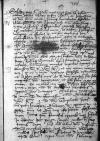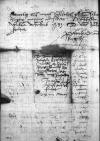 AAWO, AB, D. 67, k. 248r
AAWO, AB, D. 67, k. 248r
Salutem, quam Reverendissimae Dominationi Vestrae meus animus precari non desinit, minime verbis consequi possem.
Carissime ac Humanissime mi Domine, summo amore summaque benevolentia observande.
Humanissimas Dominationis Vestrae cf. Ioannes DANTISCUS to Petrus Mirabilis de MONTEREGALE Löbau (Lubawa), 1533-09-09, CIDTC IDL 7055, letter lost⌊litterascf. Ioannes DANTISCUS to Petrus Mirabilis de MONTEREGALE Löbau (Lubawa), 1533-09-09, CIDTC IDL 7055, letter lost⌋, mihi autem gratissimas, in Löbau (Lubawa, Lubavia), town in northern Poland, Kulm Land (Ziemia Chełmińska), ca. 67 km E of Graudenz (Grudziądz), the main seat of the bishops of Kulm (Chełmno)⌊arce LubaviensiLöbau (Lubawa, Lubavia), town in northern Poland, Kulm Land (Ziemia Chełmińska), ca. 67 km E of Graudenz (Grudziądz), the main seat of the bishops of Kulm (Chełmno)⌋ 1533-09-09⌊9-a Septembris1533-09-09⌋ exaratas Monzón, town in eastern Spain, Aragon, parliamentary centre of the Crown of Aragon, and important staging post between Zaragoza and Barcelona⌊MontissoniMonzón, town in eastern Spain, Aragon, parliamentary centre of the Crown of Aragon, and important staging post between Zaragoza and Barcelona⌋ 1533-11-28⌊28-a Novembris1533-11-28⌋ summo cum amore, ut debebam, summaque cum voluptate et os written over l⌈lss written over l⌉culatus, et mirifice amplexus sum, singulariter tamen subscriptionem, quam et manu propria exscripsit, et qua ore proprio Pomesania diocese (dioecesis Pomesaniensis)⌊episcopatus PomesaniensisPomesania diocese (dioecesis Pomesaniensis)⌋ esse administratorem praedicavit. Hanc cum legissem, ego non mediocriter gavisus gaudio exsilui maximo et Dominationi Vestrae Reverendissimae maxime gratulor, Deoque Optimo Maximo fortunaeque immensas gratias ago, qui beneficium vestrum de Poland (Kingdom of Poland, Polonia)⌊Regno,Poland (Kingdom of Poland, Polonia)⌋ Sigismund I Jagiellon (Zygmunt I) (*1467 – †1548), King of Poland and Grand Duke of Lithuania (1506-1548); Duke of Głogów (Glogau) (1499-1506), Duke of Opava (1501-1506), Governor of Silesia (1504-1506); son of King Kazimierz IV Jagiellon and Elisabeth of Austria⌊regeSigismund I Jagiellon (Zygmunt I) (*1467 – †1548), King of Poland and Grand Duke of Lithuania (1506-1548); Duke of Głogów (Glogau) (1499-1506), Duke of Opava (1501-1506), Governor of Silesia (1504-1506); son of King Kazimierz IV Jagiellon and Elisabeth of Austria⌋ Bona Sforza (*1494 – †1557), Queen of Poland and Grand Duchess of Lithuania (1518-1557); the second wife of Sigismund I Jagiellon; Duchess of Bari and Rossano; daughter of Gian Galeazzo Sforza of Milan and Isabella of Aragon⌊reginaqueBona Sforza (*1494 – †1557), Queen of Poland and Grand Duchess of Lithuania (1518-1557); the second wife of Sigismund I Jagiellon; Duchess of Bari and Rossano; daughter of Gian Galeazzo Sforza of Milan and Isabella of Aragon⌋ benemeritum apud principes minime ingratos, sed beneficiorum memores reponere dignatus est. Quae quidem cf. Ioannes DANTISCUS to Petrus Mirabilis de MONTEREGALE Löbau (Lubawa), 1533-09-09, CIDTC IDL 7055, letter lost⌊litteraecf. Ioannes DANTISCUS to Petrus Mirabilis de MONTEREGALE Löbau (Lubawa), 1533-09-09, CIDTC IDL 7055, letter lost⌋ Dominationem Vestram Reverendissimam et mei minime immemorem, et me in numerum vestrorum scripsisse insinuarunt, et id quidem nullis meis de Dominatione Vestra meritis, sed sola Magnificentiae Vestrae benignitate et solo summo erga me amore. Et eo tantis iam in me beneficiis quamquam vinctum tenet, nexu nunc tamen arctissimo servitutis in perpetuum me dev<i>nxit.
Salutavi magnificum dominum meum Nicolas Perrenot de Granvelle (*1484 – †1550), doctor of both canon and civil law, one of the most trusted advisors of Emperor Charles V, in 1519 entered the service of Charles V, in 1521 took part in the Habsburg-French negotiations in Calais, in 1529 in peace negotiations with the Roman Curia and the Italian states, and later, in 1538, in the conference of Nice between Charles V and Francis I; prominent official and advisor of Charles V and of Margaret of Austria in the administration of the County of Burgundy and of the Habsburg Netherlands, collaborator of Chancellor Gattinara, 1530 secretary of State for German and Netherlandish affairs and Chancellor of the Kingdom of Sicily and Naples (he replaced Gattinara after his death in the position of Grand Chancellor, although not using the title); imperial envoy to France (several times up to 1528) (CE, vol. 3, p. 68-70; DURME 1964; ANTONY 2006)⌊dominum de GranvelaNicolas Perrenot de Granvelle (*1484 – †1550), doctor of both canon and civil law, one of the most trusted advisors of Emperor Charles V, in 1519 entered the service of Charles V, in 1521 took part in the Habsburg-French negotiations in Calais, in 1529 in peace negotiations with the Roman Curia and the Italian states, and later, in 1538, in the conference of Nice between Charles V and Francis I; prominent official and advisor of Charles V and of Margaret of Austria in the administration of the County of Burgundy and of the Habsburg Netherlands, collaborator of Chancellor Gattinara, 1530 secretary of State for German and Netherlandish affairs and Chancellor of the Kingdom of Sicily and Naples (he replaced Gattinara after his death in the position of Grand Chancellor, although not using the title); imperial envoy to France (several times up to 1528) (CE, vol. 3, p. 68-70; DURME 1964; ANTONY 2006)⌋ nomine Dominationis Vestrae Vestrae Reverendissimae, qui Dominationi Vestrae conduplicatam precatur. Non potui longiori Dominationem Vestram opprimere et propter nuntii, et Nicolas Perrenot de Granvelle (*1484 – †1550), doctor of both canon and civil law, one of the most trusted advisors of Emperor Charles V, in 1519 entered the service of Charles V, in 1521 took part in the Habsburg-French negotiations in Calais, in 1529 in peace negotiations with the Roman Curia and the Italian states, and later, in 1538, in the conference of Nice between Charles V and Francis I; prominent official and advisor of Charles V and of Margaret of Austria in the administration of the County of Burgundy and of the Habsburg Netherlands, collaborator of Chancellor Gattinara, 1530 secretary of State for German and Netherlandish affairs and Chancellor of the Kingdom of Sicily and Naples (he replaced Gattinara after his death in the position of Grand Chancellor, although not using the title); imperial envoy to France (several times up to 1528) (CE, vol. 3, p. 68-70; DURME 1964; ANTONY 2006)⌊domini meiNicolas Perrenot de Granvelle (*1484 – †1550), doctor of both canon and civil law, one of the most trusted advisors of Emperor Charles V, in 1519 entered the service of Charles V, in 1521 took part in the Habsburg-French negotiations in Calais, in 1529 in peace negotiations with the Roman Curia and the Italian states, and later, in 1538, in the conference of Nice between Charles V and Francis I; prominent official and advisor of Charles V and of Margaret of Austria in the administration of the County of Burgundy and of the Habsburg Netherlands, collaborator of Chancellor Gattinara, 1530 secretary of State for German and Netherlandish affairs and Chancellor of the Kingdom of Sicily and Naples (he replaced Gattinara after his death in the position of Grand Chancellor, although not using the title); imperial envoy to France (several times up to 1528) (CE, vol. 3, p. 68-70; DURME 1964; ANTONY 2006)⌋ fe subitam festinationem. Immo stain⌈[o]o stain⌉, cum famulus Cornelis De Schepper (Cornelius Scepperus, Cornelis De Dobbele, Cornelius Duplicius) (*1503 – †1555), erudite, diplomat in the Habsburgs' service; close friend of Ioannes Dantiscus; initially in the service of Christian II of Oldenburg, King of Denmark; 1526 secretary and councillor to Emperor Charles V of Habsburg (CE, vol. 3, p. 218-220; DE VOCHT 1961, p. 15-24)⌊CorneliCornelis De Schepper (Cornelius Scepperus, Cornelis De Dobbele, Cornelius Duplicius) (*1503 – †1555), erudite, diplomat in the Habsburgs' service; close friend of Ioannes Dantiscus; initially in the service of Christian II of Oldenburg, King of Denmark; 1526 secretary and councillor to Emperor Charles V of Habsburg (CE, vol. 3, p. 218-220; DE VOCHT 1961, p. 15-24)⌋ nos sequeretur, in itinere haec pauca scripsi. Multa tamen scripturus eram, sed ad alium diem differam. Dominus Cornelis De Schepper (Cornelius Scepperus, Cornelis De Dobbele, Cornelius Duplicius) (*1503 – †1555), erudite, diplomat in the Habsburgs' service; close friend of Ioannes Dantiscus; initially in the service of Christian II of Oldenburg, King of Denmark; 1526 secretary and councillor to Emperor Charles V of Habsburg (CE, vol. 3, p. 218-220; DE VOCHT 1961, p. 15-24)⌊Corneliuss(!)Cornelis De Schepper (Cornelius Scepperus, Cornelis De Dobbele, Cornelius Duplicius) (*1503 – †1555), erudite, diplomat in the Habsburgs' service; close friend of Ioannes Dantiscus; initially in the service of Christian II of Oldenburg, King of Denmark; 1526 secretary and councillor to Emperor Charles V of Habsburg (CE, vol. 3, p. 218-220; DE VOCHT 1961, p. 15-24)⌋ cepit cf. Ioannes DANTISCUS to Cornelis DE SCHEPPER Althausen (Starogród), 1533-10-14, CIDTC IDL 6916, letter lost⌊litterascf. Ioannes DANTISCUS to Cornelis DE SCHEPPER Althausen (Starogród), 1533-10-14, CIDTC IDL 6916, letter lost⌋ a Dominatione Vestra, ego nullas spectab stain⌈[b]b stain⌉am, tamen fratres, dominum Bernhard von Höfen (Bernhard Flachsbinder) (†after 1548), Ioannes Dantiscus' brother, stayed with Dantiscus in Spain, as a member of his mission's retinue, and was used as a trusted courier to Poland at least from 1526; after 1530 Starost of Löbau⌊BernardumBernhard von Höfen (Bernhard Flachsbinder) (†after 1548), Ioannes Dantiscus' brother, stayed with Dantiscus in Spain, as a member of his mission's retinue, and was used as a trusted courier to Poland at least from 1526; after 1530 Starost of Löbau⌋ et dominum Georg von Höfen (Georg Flachsbinder, Georgius de Curiis) (†after 1550-02-07), Ioannes Dantiscus' brother; Starosta of Rössel (HARTMANN 1525-1550, No. 584, 586, 588; AGAD, MK, 77, f. 385-386v)⌊GeorgiumGeorg von Höfen (Georg Flachsbinder, Georgius de Curiis) (†after 1550-02-07), Ioannes Dantiscus' brother; Starosta of Rössel (HARTMANN 1525-1550, No. 584, 586, 588; AGAD, MK, 77, f. 385-386v)⌋, cupio meo nomine salutari written over e⌈eii written over e⌉  AAWO, AB, D. 67, k. 248v ceterosque omnes meos consodales plurima salute impartiri maxime desidero.
AAWO, AB, D. 67, k. 248v ceterosque omnes meos consodales plurima salute impartiri maxime desidero.
 AAWO, AB, D. 67, k. 248v ceterosque omnes meos consodales plurima salute impartiri maxime desidero.
AAWO, AB, D. 67, k. 248v ceterosque omnes meos consodales plurima salute impartiri maxime desidero.
